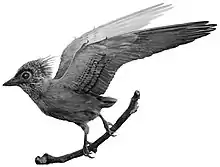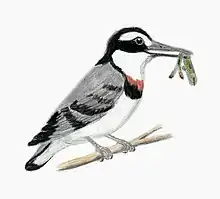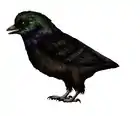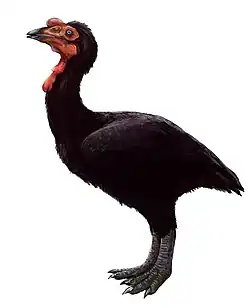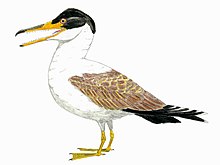| Juehuaornis Temporal range: Aptian, | |
|---|---|
| Scientific classification | |
| Domain: | Eukaryota |
| Kingdom: | Animalia |
| Phylum: | Chordata |
| Clade: | Dinosauria |
| Clade: | Saurischia |
| Clade: | Theropoda |
| Clade: | Avialae |
| Clade: | Ornithuromorpha |
| Genus: | †Juehuaornis Wang et al., 2015 |
| Type species | |
| Juehuaornis zhangi Wang et al., 2015 | |
| Synonyms | |
| |
Juehuaornis is an extinct genus of ornithuromorph bird from the Early Cretaceous of present-day China. It contains a single species, J. zhangi.[1]
Discovery and naming
The holotype, SJG 00001, was found near Lingyuan in a layer of the Jiufotang Formation dating from the Aptian. It consists of an almost complete and associated skeleton with skull, compressed on a plate. It preserves feather remains. The counterplate was designated as the paratype with inventory number SJG 00001A.[1]
In 2015 the type species Juehuaornis zhangi was named and described by Wang Ren-fe, Wang Yan and Hu Dongyu. The generic name combines a reference to the island of Juehua, the "Chrysanthemum Island" off the coast of Liaoning, with a Greek ὄρνις, ornis, "bird". The specific name honours curator Zhang Dayong.[1]
Description
Juehuaornis has a long beak which reaches 70% of the total skull length.[1]
Classification
Juehuaornis was placed in the Ornithuromorpha in 2015.[1] In 2016 it was suggested that Juehuaornis might be cogeneric to the closely related genera Changzuiornis and Dingavis found in the same formation, in which case Juehuaornis would have priority.[2]
References
- 1 2 3 4 5 Wang, R.-F.; Wang, Y.; Hu, 2015, D.-Y. "Discovery of a new ornithuromorph genus, Juehuaornis gen. nov. from Lower Cretaceous of western Liaoning, China". Global Geology. 2015 (1): 7–11. doi:10.3969/j.issn.1004-5589.2015.01.002.
{{cite journal}}: CS1 maint: numeric names: authors list (link) - ↑ Huang, J.; Wang, X.; Hu, Y.; Liu, J.; Peteya, J.A.; Clarke, J.A. (2016). "A new ornithurine from the Early Cretaceous of China sheds light on the evolution of early ecological and cranial diversity in birds". PeerJ. 4: e1765. doi:10.7717/peerj.1765. PMC 4806634. PMID 27019777.
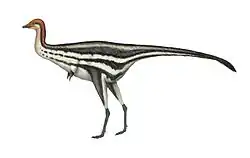
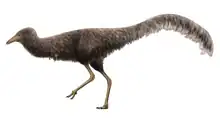
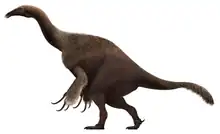
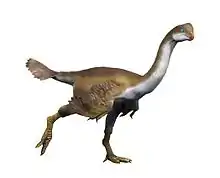
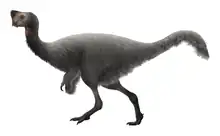
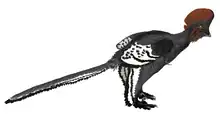


.png.webp)

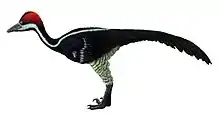
.jpg.webp)
